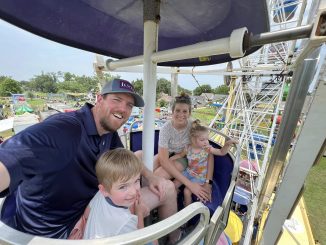
19-year-old was not expected to live into his 20s
When Michael White was born, he felt like a ragdoll when held or what doctors describe as a “floppy baby.”
It wasn’t until age 1 he was diagnosed with Prader-Willi Syndrome (PWS), which his mother, Patsy, said came with the grim outlook that her son would be a vegetable unable to walk and talk.
Today, that’s not the prognosis most give about him at 19 years old and as a senior at Hahnville High School. He’s in his fourth year in the ROTC and will graduate.White can hardly describe her relief as a mother about beating the odds associated with this rare genetic disorder that can strike anyone. It is caused by a mutated chromosome (part of the 15th chromosome is missing) passed down by the father and generally causes an insatiable hunger from a malfunctioning hypothermus, weak muscle tone and delayed development.
These children are typically born with blonde hair, lighter skin, blue eyes, almond-shaped eyes, small chins, weak muscle tone and loose joints, White said. It occurs once in every 15,000 births so it is a rare condition and, to her knowledge, her son and a 4-year-old girl are the only two in the parish with the syndrome.
Michael was nearly a year old before Patsy heard him cry for the first time.
“It was terrifying because I understood that babies cry when something is wrong so I was hyper-vigilant,” she said. “If you have a baby that doesn’t cry – what do you do? He was so young and we didn’t know what was going to happen.”Everyone in the family took turns watching him as an infant, including his three older sisters. A younger brother came along and none of them were diagnosed with PWS.
Michael had to wear a feeding tube as an infant and, when it came off, his mother had to feed him every two hours. Then, at just a year old, came the physical, occupation and speech therapists to the house every week to work with him.Even as an LPN, Patsy said she had never heard about PWS at the time of her son’s diagnosis.
Her research indicated it has two incredibly challenging parts with the first being the infant’s failure to thrive initially and then by age 3 or 4 comes the onset of the insatiable appetite where the child is unable to feel full from eating.
Without help, they can eat themselves to death.“We lost someone a little over a year go in a neighboring state where this person was able to leave a group home and found food,” White said. “They ate until the stomach ruptured. People with PWS have been known to eat any food, even in the trash can, and can choke by swallowing quickly.”
They can also resort to shoplifting to get food.“They do have to be watched constantly,” she said. “It isn’t a question of discipline or will power. Their bodies are actually telling them they’re starving no matter how much they eat.”
White added, “Imagine being the hungriest you’ve ever been and then imagine feeling that way 24/7.”Michael conceded, “It’s hard. It’s a battle.”
Additionally, living in Louisiana with such a strong food culture has posed challenges, too, she said.Despite the state’s generally overweight population, White said people have outright told her, “You need to stop feeding him,” which she said infuriated her and Michael. He added, “I want people to know we’re out there in the community to keep us safe.”
PWS patients are being studied to help them and others struggling with cravings in the nation’s obesity crisis, White said.
Michael wasn’t expected to live into his 20s and they got a list of the many things he wasn’t expected to be able to do, which she proudly proclaimed, “He’s beat that.”The optimism and success came from advancements in PWS treatment, which now helps them live into their 50s, White said. Her son will stay at HHS in special education services, as well as physical and occupational therapy, and adaptive physical education until he’s 21.
Michael also is involved in raising awareness about PWS.
He will walk in the “On the Move” walk to raise awareness and funds for PWS, and will run in the “One Small Step” marathon in Houma in October. He’s also working on starting a local chapter of the People First of Louisiana, a self-advocacy group for people with disabilities. He will get his ROTC letterman jacket at HHS homecoming.
But his proud mother, who has remained dedicated to giving her son a full life, added, “We’re making tremendous strides even though he has a disability. He not only survives – he thrives.”




Be the first to comment